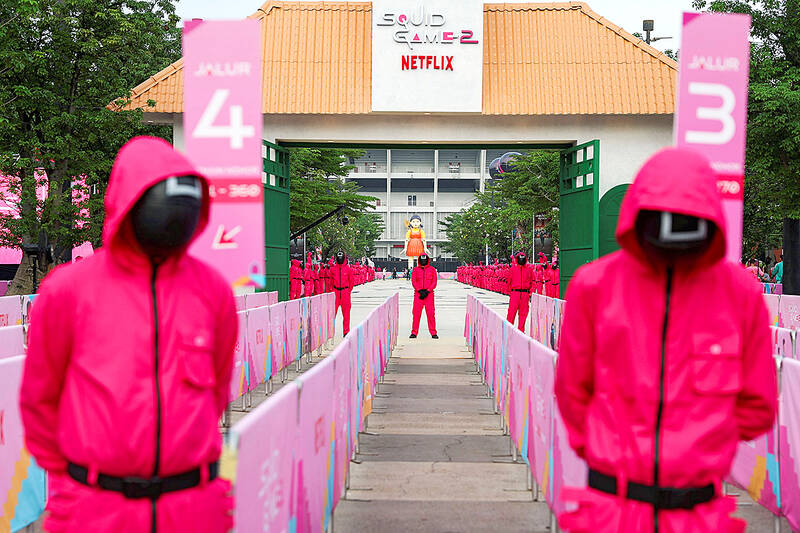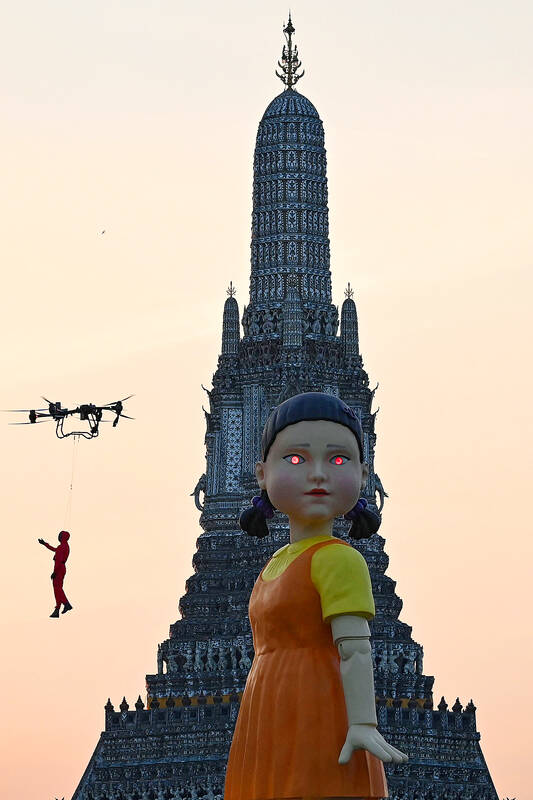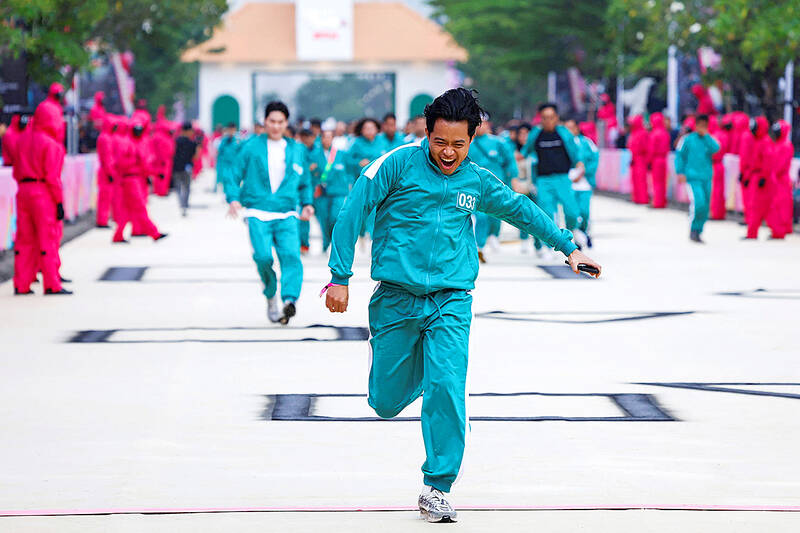A factory turned into a battlefield, riot police armed with tasers and an activist who spent 100 days atop a chimney — the unrest that inspired Netflix’s most successful show ever has all the hallmarks of a TV drama.
This month sees the release of the second season of Squid Game, a dystopian vision of South Korea where desperate people compete in deadly versions of traditional children’s games for a massive cash prize.
But while the show itself is a work of fiction, Hwang Dong-hyuk, its director and writer, has said the experiences of the main character Gi-hun, a laid-off worker, were inspired by the violent Ssangyong strikes in 2009.

Photo: Reuters
“I wanted to show that any ordinary middle-class person in the world we live in today can fall to the bottom of the economic ladder overnight,” he has said.
In May 2009, Ssangyong, a struggling car giant taken over by a consortium of banks and private investors, announced it was laying off more than 2,600 people, or nearly 40 percent of its workforce.
That was the beginning of an occupation of the factory and a 77-day strike that ended in clashes between strikers armed with slingshots and steel pipes and riot police wielding rubber bullets and tasers.

Photo: AFP
Many union members were severely beaten and some were jailed.
‘MANY LOST THEIR LIVES’
The conflict did not end there.

Photo: Reuters
Five years later, union leader Lee Chang-kun held a sit-in for 100 days on top of one of the factory’s chimneys to protest a sentence in favor of Ssangyong against the strikers.
He was supplied with food from a basket attached to a rope by supporters and endured hallucinations of a tent rope transformed into a writhing snake.
Some who experienced the unrest struggled to discuss Squid Game because of the trauma they endured, Lee said.
The repercussions of the strike, compounded by protracted legal battles, caused significant financial and mental strain for workers and their families, resulting in around 30 deaths by suicide and stress-related issues, Lee said.
“Many have lost their lives. People had to suffer for too long,” he said.
He vividly remembers the police helicopters circling overhead, creating intense winds that ripped away workers’ raincoats.
Lee said he felt he could not give up.
“We were seen as incompetent breadwinners and outdated labor activists who had lost their minds,” he said.
“Police kept beating us even after we fell unconscious — this happened at our workplace, and it was broadcast for so many to see.”
Lee said he had been moved by scenes in the first season of Squid Game where Gi-hun struggles not to betray his fellow competitors.
But he wished the show had spurred real-life change for workers in a country marked by economic inequality, tense industrial relations and deeply polarized politics.
“Despite being widely discussed and consumed, it is disappointing that we have not channeled these conversations into more beneficial outcomes,” he said.
‘SHADOW OF STATE VIOLENCE’
The success of Squid Game in 2021 left him feeling “empty and frustrated.”
“At the time, it felt like the story of the Ssangyong workers had been reduced to a commodity in the series,” Lee said.
Squid Game, the streaming platform’s most-watched series of all time, is seen as embodying the country’s rise to a global cultural powerhouse, part of the “Korean wave” alongside the Oscar-winning Parasite and K-pop stars such as BTS.
But its second season comes as the Asian democracy finds itself embroiled in some of its worst political turmoil in decades, triggered by conservative President Yoon Suk-yeol’s failed bid to impose martial law this month.
Yoon has since been impeached and suspended from duties pending a ruling by the Constitutional Court.
That declaration of martial law risked sending the Korean wave “into the abyss”, around 3,000 people in the film industry, including Parasite director Bong Joon-ho, said in a letter following Yoon’s shocking decision.
Vladimir Tikhonov, a Korean studies professor at the University of Oslo, said that some of South Korea’s most successful cultural products highlight state and capitalist violence.
“It is a noteworthy and interesting phenomenon — we still live in the shadow of state violence, and this state violence is a recurrent theme in highly successful cultural products.”

Sept. 1 to Sept. 7 In 1899, Kozaburo Hirai became the first documented Japanese to wed a Taiwanese under colonial rule. The soldier was partly motivated by the government’s policy of assimilating the Taiwanese population through intermarriage. While his friends and family disapproved and even mocked him, the marriage endured. By 1930, when his story appeared in Tales of Virtuous Deeds in Taiwan, Hirai had settled in his wife’s rural Changhua hometown, farming the land and integrating into local society. Similarly, Aiko Fujii, who married into the prominent Wufeng Lin Family (霧峰林家) in 1927, quickly learned Hoklo (commonly known as Taiwanese) and

The low voter turnout for the referendum on Aug. 23 shows that many Taiwanese are apathetic about nuclear energy, but there are long-term energy stakes involved that the public needs to grasp Taiwan faces an energy trilemma: soaring AI-driven demand, pressure to cut carbon and reliance on fragile fuel imports. But the nuclear referendum on Aug. 23 showed how little this registered with voters, many of whom neither see the long game nor grasp the stakes. Volunteer referendum worker Vivian Chen (陳薇安) put it bluntly: “I’ve seen many people asking what they’re voting for when they arrive to vote. They cast their vote without even doing any research.” Imagine Taiwanese voters invited to a poker table. The bet looked simple — yes or no — yet most never showed. More than two-thirds of those

In the run-up to the referendum on re-opening Pingtung County’s Ma-anshan Nuclear Power Plant last month, the media inundated us with explainers. A favorite factoid of the international media, endlessly recycled, was that Taiwan has no energy reserves for a blockade, thus necessitating re-opening the nuclear plants. As presented by the Chinese-language CommonWealth Magazine, it runs: “According to the US Department of Commerce International Trade Administration, 97.73 percent of Taiwan’s energy is imported, and estimates are that Taiwan has only 11 days of reserves available in the event of a blockade.” This factoid is not an outright lie — that

The People’s Republic of China (PRC) yesterday paraded its military hardware in an effort to impress its own population, intimidate its enemies and rewrite history. As always, this was paced by a blizzard of articles and commentaries in the media, a reminder that Beijing’s lies must be accompanied by a bodyguard of lies. A typical example is this piece by Zheng Wang (汪錚) of Seton Hall in the Diplomat. “In Taiwan, 2025 also marks 80 years since the island’s return to China at the end of the war — a historical milestone largely omitted in official commemorations.” The reason for its